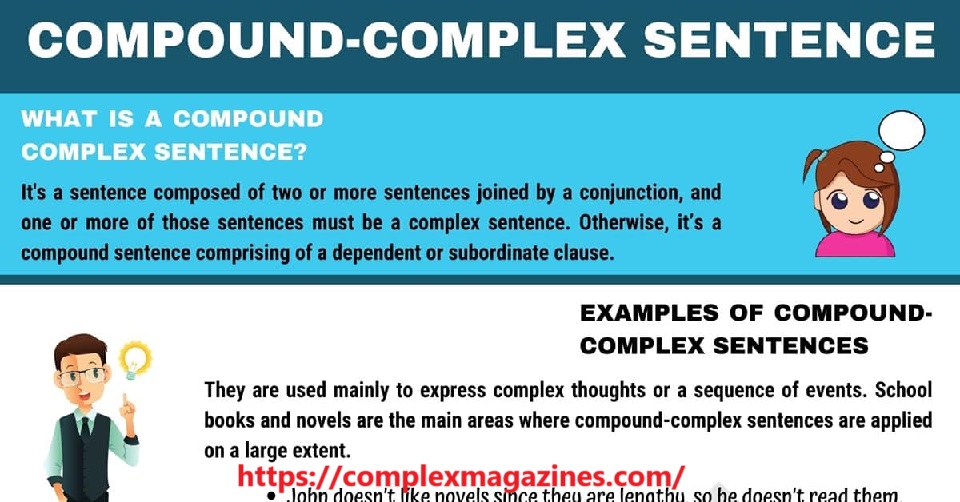
In the vast world of grammar, we often hear terms like simple sentences, complex sentences, and compound sentences. However, compound-complex sentences might sound a little more intimidating. But don’t worry! It’s just a fancy name for a sentence structure that is both flexible and powerful. If you want to become a stronger writer and communicator, mastering this type of sentence is key. Let’s dive into the details of what a compound-complex sentence is, how you can use it, and why it’s so effective in communication.
1. What Is a Compound Complex Sentence?
Let’s start with the basics: What exactly is a compound complex sentence? A compound-complex sentence is a sentence that contains at least two independent clauses and one or more dependent clauses. In simpler terms, it’s like combining two or more sentences that could stand alone, but they are connected to one or more additional clauses that rely on the main sentence for meaning.
Here’s an example: “I went to the store, and I bought some bread because we were out.”
In this sentence, “I went to the store” and “I bought some bread” are independent clauses, meaning they can stand alone as complete sentences. The phrase “because we were out” is a dependent clause—it can’t stand on its own and depends on the rest of the sentence for context.
2. Breaking Down the Structure
Understanding the structure of a compound complex sentence is easier if we break it into parts:
- Independent Clauses: These are complete thoughts that can stand alone as sentences.
- Dependent Clauses: These are incomplete thoughts that cannot stand alone and need an independent clause to form a complete sentence.
- Coordinating Conjunctions: Words like “and,” “but,” “or,” and “so” that link independent clauses.
- Subordinating Conjunctions: Words like “because,” “although,” “if,” “when,” and “since” that link dependent clauses to independent ones.
3. The Importance of Compound Complex Sentences
Why are compound complex sentences so important? Simple sentences are great for clarity, but they can become repetitive or choppy if used too often. Compound complex sentences allow for more nuanced communication. They enable writers to connect ideas, show cause and effect, and elaborate on multiple points without creating long, run-on sentences. Think of them as a bridge that links thoughts smoothly and clearly.
4. How to Identify Compound Complex Sentences
Recognizing a compound complex sentence can be tricky, but here’s a quick tip: if you see two or more independent clauses connected by coordinating conjunctions and at least one dependent clause, you’re likely dealing with a compound complex sentence.
For example: “Although it was raining, we went to the park, and we had a great time.”
In this sentence:
- Independent clauses: “We went to the park” and “we had a great time.”
- Dependent clause: “Although it was raining.”
5. Simple vs. Compound Complex Sentences
A simple sentence contains just one independent clause, like: “She runs every morning.”
Compare that with a compound-complex sentence: “She runs every morning because she loves the fresh air, and she feels energized for the rest of the day.”
The simple sentence is straightforward, but the compound-complex sentence offers more depth, explaining why she runs and the effect it has on her.
6. Compound vs. Compound Complex Sentences
A compound sentence contains two or more independent clauses but no dependent clauses. An example of a compound sentence is: “I love coffee, and I drink it every day.”
Now, compare that with a compound-complex sentence: “I love coffee, and I drink it every day because it keeps me focused.”
Notice how the dependent clause (“because it keeps me focused”) adds an extra layer of information to the sentence.
7. Complex vs. Compound Complex Sentences
A complex sentence contains one independent clause and at least one dependent clause, like: “Because it was raining, we stayed indoors.”
In contrast, a compound-complex sentence adds another independent clause to the mix: “Because it was raining, we stayed indoors, and we watched a movie.”
The extra independent clause allows for a more complete and detailed thought.
8. Examples of Compound Complex Sentences
Examples are often the best way to solidify understanding. Here are a few more compound complex sentences to help clarify:
- “The sun was setting, and the sky turned orange because the clouds were clearing.”
- “Although she was tired, she finished her homework, and she went to bed early.”
- “I forgot my keys, but luckily, my friend had a spare because she had borrowed them last week.”
In each example, you can see how multiple ideas are connected smoothly, adding richness to the sentence.
9. How to Create Your Own Compound Complex Sentences
Creating compound-complex sentences may seem difficult at first, but with practice, it becomes second nature. Here’s a simple strategy:
- Start with two independent clauses.
- Add a dependent clause using subordinating conjunctions like “because,” “although,” or “if.”
- Use coordinating conjunctions like “and” or “but” to link the independent clauses.
Here’s an example of building a compound-complex sentence:
- Independent clause: “I went to the gym.”
- Add another independent clause: “I worked out for an hour.”
- Add a dependent clause: “because I wanted to stay healthy.”
The final sentence: “I went to the gym, and I worked out for an hour because I wanted to stay healthy.”
10. Common Mistakes to Avoid
There are a few common pitfalls to watch out for when writing compound complex sentences:
- Run-on sentences: Be careful not to add too many clauses without punctuation.
- Incorrect conjunctions: Use the right conjunctions to link clauses. For example, “and” connects similar ideas, while “but” introduces contrast.
- Misplacing commas: Use commas to separate clauses properly, especially before coordinating conjunctions.
11. Why Use Compound Complex Sentences?
Why should you bother with compound complex sentences when simple sentences are easier? The answer is versatility. Compound complex sentence allow you to express more detailed and connected ideas in a single sentence. This can make your writing more engaging, clear, and dynamic, especially in academic or professional settings.
12. Compound Complex Sentences in Everyday Writing
You probably use compound-complex sentences more often than you realize. In everyday speech and writing, these sentences help us convey complex thoughts quickly and effectively. For instance, when telling a story, you might say: “We went to the mall, and I bought a new dress because there was a sale.”
The flow and connection between ideas make your communication smoother and more natural.
13. Practice Exercises
Want to test your understanding? Try writing a few sentences on your own. Here are a couple of prompts to get you started:
- Write about your last vacation using a compound-complex sentence.
- Describe a typical day at work or school using multiple compound-complex sentences.
14. Compound Complex Sentences in Literature
In literature, compound-complex sentences add rhythm and depth to storytelling. Take this example from Charles Dickens’ “A Tale of Two Cities”: “It was the best of times, it was the worst of times, it was the age of wisdom, it was the age of foolishness.”
Though slightly exaggerated, it shows how sentence complexity can be used to emphasize contrasting ideas.
15. Conclusion
Compound complex sentences are the superheroes of sentence structure, giving writers the tools to connect multiple ideas smoothly and clearly. Whether you’re writing a novel, an essay, or even a casual email, mastering this sentence structure can help you become a more effective communicator.
FAQs
1. What is a compound-complex sentence?
A compound-complex sentence contains at least two independent clauses and one or more dependent clauses, providing a more detailed way to express ideas.
2. How do you identify a compound-complex sentence?
Look for at least two independent clauses connected by coordinating conjunctions and one dependent clause attached using subordinating conjunctions.
3. What is the difference between a complex and compound-complex sentence?
A complex sentence has one independent clause and one or more dependent clauses, while a compound-complex sentence includes at least two independent clauses and one or more dependent clauses.
4. Why should I use compound-complex sentences?
They allow for more nuanced communication, connecting ideas and showing relationships between them more effectively.
5. Can compound-complex sentences improve my writing?
Yes! They add depth and variety to your writing, making it more engaging and polished.
Read More: Complex Magazines

